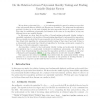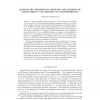384 search results - page 10 / 77 » Equivalence Relations on Classes of Computable Structures |
BIRTHDAY
2009
Springer
13 years 8 months ago
2009
Springer
Conventional computation models restrict to particular data structures to represent states of a computation, e.g. natural numbers, s, stacks, etc. Gurevich's Abstract State Ma...
ICALP
2010
Springer
14 years 14 days ago
2010
Springer
We say that a polynomial f(x1, . . . , xn) is indecomposable if it cannot be written as a product of two polynomials that are defined over disjoint sets of variables. The polynom...
TNN
2010
13 years 2 months ago
2010
Soft computing (SC) emerged as an integrating framework for a number of techniques that could complement one another quite well (artificial neural networks, fuzzy systems, evolutio...
LPAR
2010
Springer
13 years 5 months ago
2010
Springer
We present a sound and complete model of lambda-calculus reductions based on structures inspired by modal logic (closely related to Kripke structures). Accordingly we can construct...
APAL
2010
13 years 7 months ago
2010
Given two infinite binary sequences A, B we say that B can compress at least as well as A if the prefix-free Kolmogorov complexity relative to B of any binary string is at most as ...


